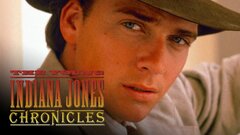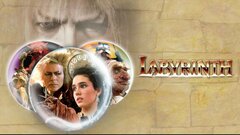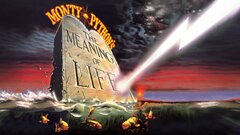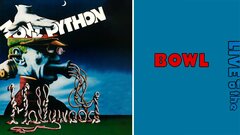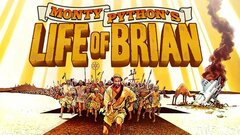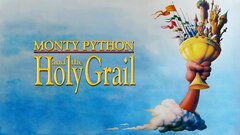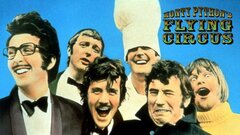A founding member of England's legendary Monty Python, Terry Jones was a writer, director, and performer whose avuncular demeanor belied a genuine talent for the absurd. He was a familiar figure in UK television prior to joining Python in 1969, thanks to such shows as "The Frost Report" (BBC, 1966) and the surreal children's series "Do Not Adjust Your Set" (ITV, 1967-69).
On "Monty Python's Flying Circus" (BBC 1, 1969-1974), Jones was a flawless straight man for the manic exuberances of Graham Chapman and John Cleese, but frequently shone as either dense, self-impressed businessmen or screeching older women. He was also one of the chief architects of the show's visual style and stream of consciousness writing, which had a great influence on later sketch comedy series.
He would later direct or co-direct nearly all of their theatrical features. After Python, Jones worked in a variety of media, from television comedies and documentaries on medieval life to children's books and features like "Personal Services" (1987). As a member of Python and a solo talent, Jones remained a quiet if vitally important component in the development of filmed comedy for over four decades. The announcement in September 2016 that Jones was suffering from dementia brought tributes and reminiscences from fans and fellow comedians around the world. Terry Jones died on January 21, 2020 at the age of 77.
Born Terence Graham Parry Jones on Feb. 1, 1942, he was born in Colwyn Bay, Wales and lived there until after World War II when his father, having returned from services with the Royal Air Force in India, relocated the family to Surrey. Jones developed an interest in writing and performing at an early age; he recalled penning his first poem at the age of five, and was an avid fan of "The Goon Show" on the radio and Danny Kaye in feature films.
Both convinced him to become a performer when he came of age, but he found it difficult to gain exposure to the craft due to the headmaster at the Royal Grammar School in Guildford, who viewed acting as an inappropriate profession for young men. Jones applied to both Cambridge and Oxford for his college education; he accepted the invitation of the latter just days before receiving a similar response from Cambridge.
Had he gone to Cambridge, he might have encountered his future Python compatriots Graham Chapman and John Cleese in the school's well-regarded Footlights theater group. But at Oxford, he would encounter another Python-to-be, and a collaborator for decades to come in Michael Palin. The pair would perform together for the first time at Oxford as part of the Oxford Revue.
After college, he took a job as a copywriter at Anglia Television before accepting a call from the BBC to work in their Light Entertainment division. With Palin, he contributed to many of the better television comedies series on UK television in the late 1960s, including "The Frost Report" (BBC, 1966), where he eventually met Cleese and Chapman, as well as Eric Idle. Jones and Palin eventually became performers as well as writers and were featured in several series, including "Twice a Fortnight" (BBC, 1967) and the acclaimed children's series "Do Not Adjust Your Set," where they were joined by Idle.
The success of their work on the latter series led to an offer for their own show on ITV in 1969; however, just as pre-production began on the program, Jones, Palin, and Idle were asked by the BBC to partner with Cleese and Chapman on a new series for that network. Cleese was concerned about working on a two-man show with Chapman, whose work habits were best described as erratic, and reached out to Palin, with whom he had worked on several projects. Palin suggested bringing Jones and Idle, along with American artist Terry Gilliam, to the new series, which in 1969 reached British airwaves as "Monty Python's Flying Circus."
As a performer on "Python," Jones was frequently called upon to play straight man to the operatic heights of lunacy struck by Cleese or Chapman. He also excelled at playing caricatures of middle-class citizens, most notably screeching washerwomen or stuffy, bowler-hat-wearing businessmen, as seen in the famous "Candid Photography"/"Nudge, Nudge" sketch. His sketches with Palin were among the most densely constructed and offbeat of the series; in the "Mouse Organ" sketch, he cheerily presents a musical instrument filled with mice that, when struck with a mallet, can emit squeaks to the tune of "The Bells of St. Mary." His greatest contribution to the show - and to television comedy as a whole - may have been the show's stream-of-consciousness style, which he largely developed in its earliest days.
He eschewed the standard comedy format of formal sketches that built to a punch line, and encouraged a more fluid style that often broke the third wall or simply flowed into another sketch altogether. Jones also suggested a similar approach to their show's direction - skits were filmed outdoors, and relied on none of the then-standard devices popular to TV comedy, such as heavy-handed music cues or static camera movement. The unique aesthetic he brought to "Python" would prove highly influential with generations of television comics and writers, and could be seen in programs on both sides of the Atlantic ranging from "Little Britain" (BBC 3/1, 2003-06) to "The Kids in the Hall" (CBC/HBO, 1988-1994) and "Mr. Show" (HBO, 1995-98).
Jones also lent that approach to three of the Pythons' feature films, which began in earnest after the group brought the series to a close in 1974. Jones and Gilliam split the direction on the second Python film "Monty Python and the Holy Grail" (1975), which took apart the Arthurian legend in typical madcap form. The production was a difficult one, according to all parties, due in no small part to the differing styles of the directors. Gilliam favored the technical aspects over the performances, while Jones applied the economical approach of the series to the feature film, with scenes lensed in wide angles and with few cuts to place the emphasis on the actors.
The latter proved the most effective, and Jones was tapped to direct the next two theatrical sketch films - 1979's Monty Python's Life of Brian" and "Monty Python's The Meaning of Life" (1983). He also continued to perform in supporting roles in each film - in "Holy Grail," he is the befuddled Sir Bevedere, who conducts the film's memorable witch-hunting scene, while in "Brian," he plays the mother of would-be Messiah Brian, among other roles. His most infamous screen portrayal, however, was in "Meaning of Life," where he donned considerable makeup to play the morbidly obese Mr. Creosote, whose hunger for food leads to a stomach-churning conclusion.
Jones also reprised many of his television sketches in the Python concert film "Live at the Hollywood Bowl" (1982), and served as performer and director for several of the Secret Policeman's Ball shows, which teamed the Pythons with other British comedy greats and legendary musicians to benefit Amnesty International.
In addition to his work with Python, Jones enjoyed a wide-ranging solo career that included numerous TV projects, films, and countless books. With Palin, he created the BBC 1 series "Ripping Yarns" (1976-79), which parodied the breathless pulp adventures enjoyed by English schoolboys in the years prior to World War II. His fascination with medieval history and culture led to a string of books devoted to the subject, beginning in 1980 with "Chaucer's Knight: The Portrait of a Medieval Mercenary," as well as numerous books of fairy tales and children's stories.
One of these, "The Saga of Erik the Viking" (1983), which he penned for his son, served as the basis for a feature film, 1989's "Erik the Viking," with Tim Robbins as a kind-hearted Norseman and appearances by Jones and Cleese. The project proved an unsatisfying one for Jones, but a 2006 re-edit by his son Bill - for whom the book was written - proved more to his liking. In addition to his fiction work, Jones penned numerous editorials on current affairs for English newspapers; his articles in condemnation of the Iraq War were published in the book Terry Jones' War on the War on Terror.
Jones' fascination for the Dark Ages also led to a series of well-regarded documentaries on the subject for the BBC. Jones served as writer and presenter in each of the programs, which examined the Crusades ("The Crusades," BBC, 1995), technology ("Ancient Inventions," BBC, 1998), and the day-to-day existence of citizens in medieval times ("Terry Jones' Medieval Lives," BBC, 2004). The latter earned him an Emmy nomination for Outstanding Writing for Non-Fiction Programming in 2004.
Jones also tackled the history of numbers with "The Story of 1" (BBC, 2005), which took him around the globe to trace the development of the modern numerical system and mathematics. In all cases, the projects shed new light on long-established historical opinions - "Terry Jones' Barbarians" (BBC, 2006), for example, suggested that the European cultures who conquered ancient Rome were far more sophisticated than described in accounts from the period.
Jones also retained his interest in comedy features and television throughout this busy period. In 1987, he directed the comedy "Personal Services," which was inspired by a real-life brothel that catered to elderly clientele. The film was later banned by the Republic of Ireland, which had previously only banned three other films - two of which were Jones' "Monty Python and the Holy Grail" and "Monty Python's "The Meaning of Life."
In 1996, he directed and co-starred with Palin, Cleese, Idle, and Steve Coogan in an adaptation of Kenneth Grahame's "The Wind in the Willows," which was seen in America as "Mr. Toad's Wild Ride." He also penned the English translation for the French comedy "Asterix and Obelix Take on Caesar" (1999), and lent his voice to tubby sidekick Obelix for the English language dub.
He served as executive producer on a French animated series called "Sacres dragons" (1996-1998), which aired on Toon Disney as "Blazing Dragons," and oversaw the final reunion of all six original Python members in "Parrot Sketch Not Included - 20 Years of Monty Python," which aired in 1989 shortly after Chapman's death from cancer. In typical cheeky form, Jones was quoted in regard to his longtime collaborator's passing as "the worst case of party-pooping in all history."
In 2006, the British press revealed that Jones had been diagnosed with bowel cancer, but subsequent stories soon reported that exploratory surgery had resulted in successful remission. Jones returned to his busy schedule of production and writing, which later encompassed his first musical opera, "Evil Machines," based on a collection of his short stories. Jones co-wrote the libretto and directed the production, which premiered in Lisbon, Portugal.
That same year, Jones returned to his historian role, writing and presenting the documentary miniseries "Barbarians" (BBC 2006) and "Terry Jones' Great Map Mystery" (BBC Wales 2008). After serving as narrator of the comedy series "The Legend of Dick and Dom" (BBC 2009-2011), Jones took part in the temporary 2013 live reunion of Monty Python, followed by the concert film "Monty Python Live (Mostly)" (2014), with the subtitle "One Down, Five To Go" darkly saluting the late Chapman. Jones next co-wrote and directed the science fiction comedy "Absolutely Anything" (2015), starring Simon Pegg with cameo appearances by two generations' worth of British comedy stars including all the surviving Python members, Eddie Izzard, and Joanna Lumley.
In September 2016, it was announced that Jones had been diagnosed with a speech-restricting form of dementia known as primary progressive aphasia. Terry Jones died of complications from the disease on January 21, 2020. He was 77.





















































